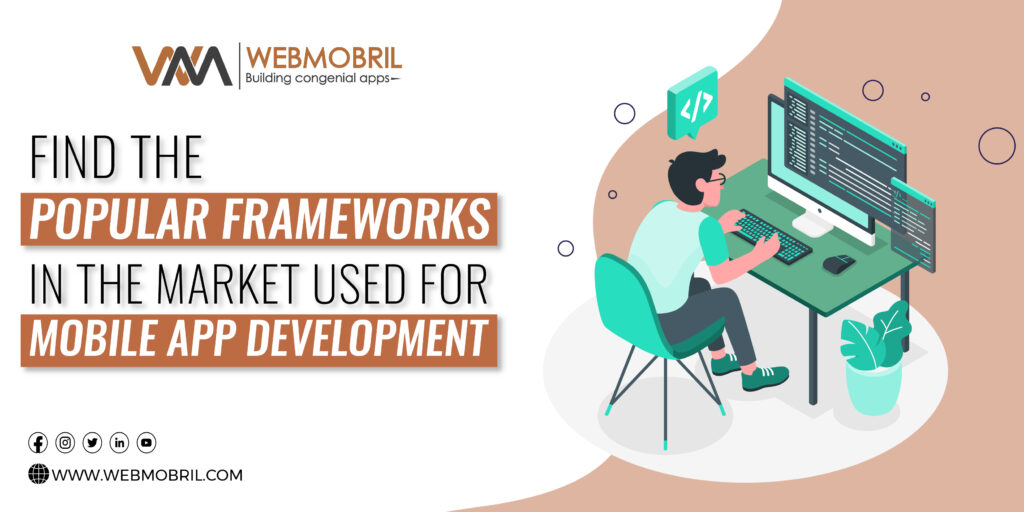Smartphones have become a vital part of daily lives, almost a habit. Not to mention, engaging and resourceful mobile apps have driven this change. Almost every new and old business is offering services through their mobile apps to gain a competitive edge in the market. In fact, mobile apps have provided a completely revolutionized approach to operating business.
Hence the demand for mobile apps is automatically increasing and for mobile app development frameworks as well. Here are the popular frameworks used for iOS and Android App Development Services.
Popular Mobile App Development Frameworks.
React Native
Among the top frameworks used by every mobile app development company, React Native is the most famous JavaScript-based framework. It was introduced by Facebook in 2018, and later gained huge popularity among developers. Around 42% of app developers use React Native framework, the reason is that this platform allows mobile app development in native environments for iOS and Android services.
However, the main advantage of using this framework is that you can build cross-platform mobile applications using a single code. Therefore, React Native framework is a popular choice among app developers, startups and business owners.
Some more features of React Native are
- Less development time
- Support for third-party plugins
- Low-code
- Live Reload
- Declarative API for predictive UI
Flutter
When it comes to creating native iOS and Android apps with a simple codebase, developers typically prefer the Flutter framework. This is an open and free framework by Google and an excellent SDK for cross-platform app development. Flutter allows app development through a novel technique which makes it an unparalleled and reliable smartphone UI framework, swiftly developing apps that are quite attractive.
Flutter is a comprehensive framework that includes widgets, debugging and integrating APIs, a rendering engine, and potential resources to support developers in creating and deploying attractive mobile apps.
Many renowned organizations, like Google and Abbey Road Studio, use the Flutter framework for app development.
Significant features of Flutter
- Quicker development process
- More appealing and engaging visuals and interface designs
- Cross-platform development
- App performance which is quite similar to the native one
Xamarin
Microsoft acquired Xamarin is another cross-platform development framework that developers generally use to create iOS and Android apps. Xamarin apps are written in C# programing language and require lesser lines for coding. Therefore, this framework facilitates faster coding. Moreover, it allows moving content quickly across different platforms like Windows and macOS.
Mobile app development these days has become so quickly, so there could be higher possibilities of a downfall in the quality of apps. But apps developed on Xamarinv are delivered with smooth native features along with quality and effectiveness. It is basically due to the collaboration between Xamarin and Microsoft Visual Studio that become a plus point in management and productivity during app development.
There’s an intermediate layer in Xamarin that controls the system between the core framework code and standard code. By using different tools, frameworks, and computer languages supported by a highly professional community, developers can cultivate an environment with APIs, components, backends, etc.
Ionic
With cross-platform mobile applications high in demand, Ionic is another prominent framework for app development that programmers are using nowadays. Ionic offers a free platform, however, it uses advanced HTML, CSS3, and Javascript for Native, web, and hybrid app development solutions.
This framework provides the best alternative for web and hybrid app development that uses HTML5. Ionic is mostly used to build applications for well-known platforms such as Android, Windows, and iOS. Additionally, with the minimal utilization of DOM, Ionic is able to give the best performance.
Swiftic
Swiftic is named among the effortless or most simple mobile app development frameworks. It simplifies the entire development process of mobile apps and allows developers to incorporate existing material from the internet rather than starting from scratch. Furthermore, the Swiftic framework offers a smooth and straightforward user experience.
Features like push alerts, social media platform feed, app advertising, and other technological advances in this framework facilitate seamless app building. It is safe to say that Swiftic is one of the simplest mobile app development platforms as it allows designing, launching and scaling the app through a unified control panel.
Features of Swiftic:
- Simple interface and navigation
- Robust integration with third parties
- Programs with a 30-day money-back assurance
Bottom Line
There is a large number of frameworks available on the market for iOS and Android app development services. But you can easily choose the one by precisely aligning your requirements. However, by partnering WebMobril Technologies, a top mobile app development company, you just need to clarify whether you want a native app or hybrid app development solutions. Rest they take care of very well.
WebMobril Technologies is well-equipped with all the latest tools and technologies for building mobile apps that stand out in stores. They have experts for each framework who deliver brilliantly designed apps along the clients’ niche requirements.

